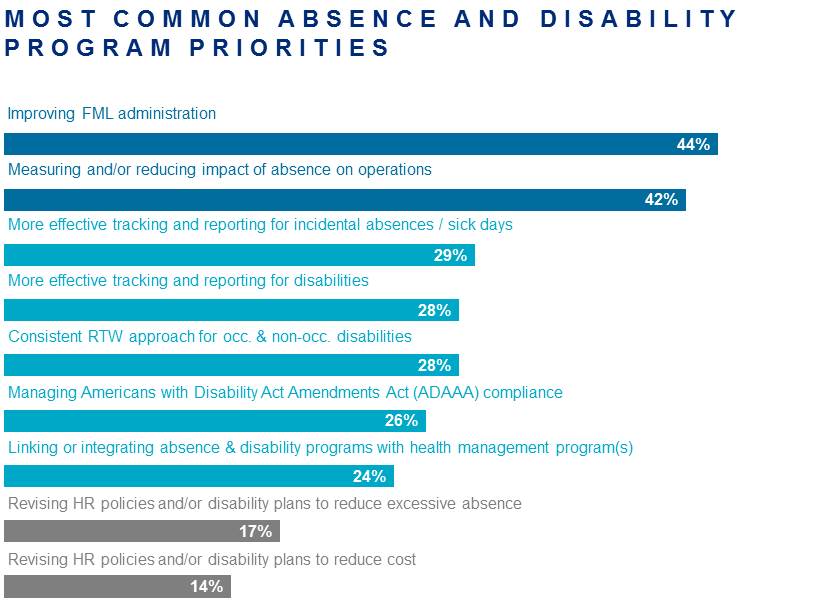Employers Tackle Increasingly Complex Leave Requirements
A plethora of Federal, state and local leave laws and regulations has made employer compliance and leave administration increasingly complex. It’s not surprising, then, that improving FML administration is the top priority for employers’ absence and disability programs. Employers are increasingly relying on outside vendors or licensing software to administer and manage these leaves and attempt to keep up with the ever-changing leave landscape. We’re seeing the fastest growth in outsourcing leave administration among small and mid-sized employers.
FMLA OUTSOURCING |
||||
EMPLOYER SIZE |
2007 |
2010 |
2013 |
2015* |
All respondents |
14% |
25% |
38% |
40% |
100 – 999 employees |
5% |
13% |
13% |
19% |
1,000 – 4,999 employees |
11% |
29% |
37% |
48% |
5,000 or more employees |
25% |
37% |
57% |
60% |
*Co-sourcing was included as an option in the 2015 survey and results for both co-sourcing and outsourcing are included in the overall outsourcing figures
An additional benefit of outsourcing often includes a change from FML “tracking” to FML “management” as disability carriers actively apply key policy provisions including eligibility, re-certifications, and clinical intervention. Further, outsourcing FML administration to the STD or LTD carrier or administrator can improve the claimant’s experience with better, more seamless integration.
Employers that co-source may be using a tracking system, with or without a compliance component, or they may have outsourced the administration but are still heavily involved in the day-to-day tactical operations for FML. Most employers that still handle administration in-house have centralized this function; only about one in 10 respondents report that in-house administration is decentralized.
FMLA Administration tactics vary significantly based on employer size. The smallest employers are most likely to use a centralized in-house approach (74% of respondents with 100-999 employees). Among the largest employers, outsourcing is more common as these very large employers not only must deal with more FML absences, but they typically operate in multiple states, making FML compliance, and the associated risk, more complex. Over half of respondents with 10,000 or more employees use specialized absence tracking software to assist with administration.
The growth in outsourcing leave administration for small employers relative to more modest growth among large employers suggests a couple of things. First, it appears that outsourcing among large employers has somewhat stabilized. Those that can outsource have done so. Those who have not may have good reasons to keep leave administration in-house. As for smaller employers, much of the growth has been fueled by growth in the breadth and quality of vendor services as well as more competitive vendor fees.
Survey respondents report that the volume of leave requests is increasing, particularly for intermittent leave, which remains especially difficult to administer and can be disruptive to day-to-day business operations. Given this increase in leave requests, it is not surprising that improving the process for FML administration remains a top priority for the majority of respondents. The largest employers (respondents with 10,000 or more employees) are more likely to struggle with training managers and HR staff (66%) and managing ADAAA accommodations (47%).

Mercer recently published a report on the findings from our most recent Survey on Absence and Disability Management, a survey of over 450 US employers. The complete survey report, which includes data tables with results broken out by employer size, region and industry, is available for purchase here. We also will post survey highlights periodically on select topics here.
